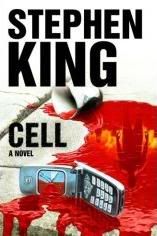BOOKS: Stephen King dials up 'Cell'
 I don't much care for cell phones. Got rid of my own last year when I realized I hardly ever used it.
I don't much care for cell phones. Got rid of my own last year when I realized I hardly ever used it. Stephen King doesn't much seem to like them either. They're the trigger that leads to worldwide apocalypse in his taut, invigorating new novel, "Cell." It's the best non-"Dark Tower" novel the man's written in several years, satisfyingly gory and frightening, with a magnificent hook.
"Cell" launches like a rocket and doesn't let up the white-knuckle tension for several chapters. It all starts one bright autumn day in Boston as aspiring comic book artist Clay Riddell stops in a park to enjoy an ice cream cone. Suddenly, half the people around him go insane. The cause appears to be an unheard pulse that affects anybody who uses a cell phone — the majority of Americans, in other words. The Pulse erases their minds, turning them into savage, zombie-like beasts. It's nothing less than the end of the world.
Clay and a small band of survivors meet up and together try to make their way in this awful new reality. But those affected by the Pulse aren't staying animalistic killers — they're evolving, into something terrible and new. "Cell" is fast-moving, relatively compact (it doesn't suffer from the excessive bloat that's marred some of King's novels), and in the end, it's a vision haunting enough to stick with you.
Stephen King is like a good cheeseburger for me – not the fanciest thing on the menu, but gosh darn it, he fills you up. The man can tell a story, and I've enjoyed many of his 30-something novels. After a certain point, a writer repeats himself a bit, and "Cell" does bear some resemblance to one of King's best, the equally apocalyptic "The Stand." It lacks that novel's enormous scope and cast, but "Cell" is his strongest since 1999's "Hearts of Atlantis."
King nicely taps into a primal fear about technology, that all our gadgets and geegaws might one day overwhelm us. "They saw we had built the Tower of Babel all over again … and on nothing but electronic cobwebs," one character realizes. "Cell" is particularly tapped into the zeitgeist in the age of iPods and Blackberrys. We get used to technology so fast, that we never consider there might be a dark side.
Whatever caused the Pulse is ultimately uncontrollable, and in his homespun way, King makes us consider what a man is at his core with the terror of "Cell." Are we just another machine? King puts a nice spin on the zombie/world's end mythos (the novel is dedicated to "Night of the Living Dead" creator George A. Romero and "I Am Legend" author Richard Matheson). The evolution of the "phone crazies" is compelling and works within the story's logic.
"Cell" does suffer with its characters, who don't quite come off as indelible creations. There's spunky girl, plucky homily-spouting old man, computer-savvy kid, and so forth, conventions not quite individual enough to be unforgettable. Only the main protagonist Clay gets more than a few dimensions. The plot pushes the story more than the characters do here; they tend to just come off as gears in the machinery. When the story moves as propulsively as it does in "Cell," though, that's a failing I barely noticed. It's King quite close to the top of his game.

No comments:
Post a Comment